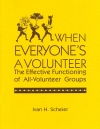Are all-volunteer groups pervasive? Yes. Important? Definitely. Literally centuries of experience with them are part of our history. Then why can't we make these groups work better? I appeal to your own experience on this. It does seem to me that non-staffed groups often resemble roller-coasters. They go up with inspiring leaders, dramatic crises or other mobilizing events; they're down or dead most of the rest of the time. There are always happy exceptions, of course, but as a rule, it is amazing how such good individuals can make up awful groups.
All this suggests a need to explore development of a body of knowledge and set of expectations specialized to non- staffed volunteer groups. I find only a few scattered works that meet this need. By contrast, the subject of how to manage volunteers working with paid staff boasts scores of books, videotapes, and hundreds of workshops and conferences.
Please notice that I said "special" body of knowledge, not "unique," in that it is mainly different in emphasis as compared to volunteer management in agencies. Nevertheless, these differences in emphasis are important. I have no "proof" of this, only a strong suspicion reinforced by the tendency of all-volunteer group leaders to avoid volunteer management conferences. I have also heard on occasion from people well-versed in volunteer program management who were frustrated by their inability to apply much of that knowledge to an all-volunteer group setting. Finally, there is a common sense expectation that groups lacking the full-time continuity of paid staff must have to do things somewhat differently.
As a rough analogy, the overlap between the two bodies of knowledge is analogous to that between tennis and Ping-pong. Certain abilities might transfer well, e.g., hand-eye coordination. In other respects, point-for-point transfer might be disastrous, as when the experienced Ping-pong player proceeds to serve in tennis by bouncing the ball once on his or her side of the net!
Another issue is the wide apparent differences among types of all-volunteer groups. What, really, does a self- help group have in common with a service club? Or either of them with a volunteer fire department? Not everything, certainly.
I believe the situation here is very much like volunteer management in agencies. Some principles apply generally to volunteer programs in hospitals, museums, prisons, schools-- whatever. But each of these settings must apply these general principles in terms of the special knowledge required in its own service area. In the same way, general principles for strengthening entirely volunteer groups would be an enriching additive rather than a replacement for manuals from a national resource headquarters for, say, a service club or local 4-H Club.
The remainder of this book explores seven special emphases which distinguish entirely volunteer groups from staffed volunteer programs in agencies:
1. The special need to cultivate a powerful, unifying vision as the "glue" of the group. You must take ample time out from implementation to talk about values, visions, and philosophy. You must raise the "why" questions and understand how what you're doing relates to these questions.
2. Wide, direct, and decisive participation of members/volunteers in setting goals to implement the group's vision. Please try to help members understand and absorb that this is not a corporation. No matter how excellent your plans "from the top down," ultimately you will only do what volunteers are willing and able to do. So why not give them a more direct share in setting goals in the first place?
3. Effective distribution of work among members/volunteers--especially vital because everybody is part time and everybody is here on a voluntary basis, or reasonably close to it.
4. Real as distinct from merely rhetorical inclusion of people. This is more a matter of spirit than method; more the taking of values seriously than technique or tactics. At the same time, some methods resonate well with the inclusive attitude.
5. Stability without staff, and continuity on a bare bones budget. Plus the related:
6. Efficiency, flexibility, and the importance of not pretending you're rich. Just because everybody is part time and voluntary, and just because your group is (probably) poor, doesn't mean you have to be unstable. Resist the temptation to invest time and money you haven't got for sophisticated things you don't need (largely because they weren't designed with you in mind in the first place).
7. Drawing resources from within the group: serious networking. Networking is a nice, popular thing for well-staffed organizations. But for all-volunteer groups, it is a necessity. This is because there is little or no money to purchase resources from outside of the group, so these must come from inside.

